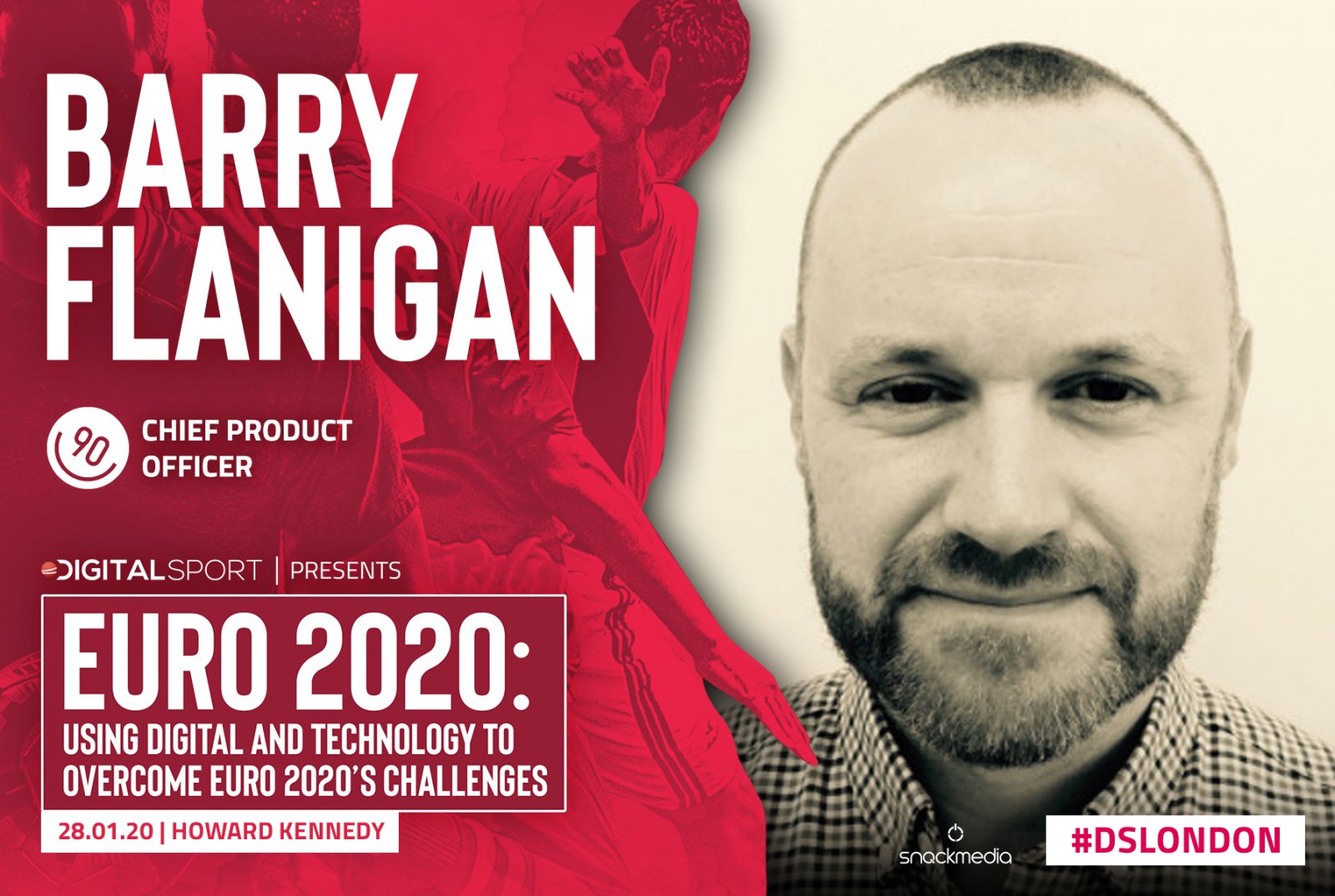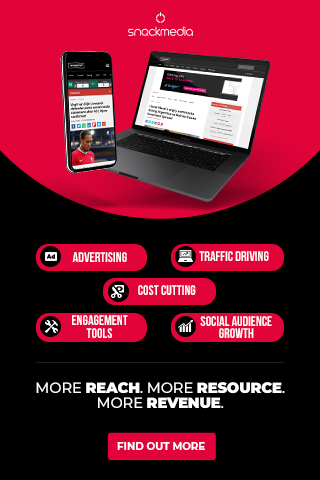Introducing our third panellist for our Euro 2020 event: COPA90’s Barry Flanigan
On the 28th January, Digital Sport will be hosting our first event of the decade, looking at Euro 2020 and the digital challenges it faces in this unique year as the tournament is being held in 12 cities in 12 different countries.
This one-off competition set-up is designed to celebrate 60 years of the Euros and gives 12 countries the chance to play “mini-host” to this grand event, the second biggest in international football. England and Wembley will be hosting all three of England’s group-stage games, as well as the semi-finals and the final.
So how will this all work from a logistical stand-point though? Event organisers, media outlets, broadcasters, teams and fans will have to venture from country to country to follow, support and report on teams. Is this practical? Is it possible for this sort of event to run smoothly? What have UEFA put in place to ensure this can work for everyone involved? Is this design just a silly and ultimately impractical way to host a tournament of this magnitude? Or, is this a brilliant way to share the load and weight of a major tournament?
With the help of our panellists, we’ll answer all this and more at Howard Kennedy on the 28th. But ahead of our event, we caught up with our third confirmed panellist Barry Flanigan, Chief Product Officer at football media brand, COPA90 who gave us some of his thoughts on the upcoming Euros. Before getting into the nitty-gritty of this summer’s championships, we wanted to get to know a little more about our panellist.
He started by explaining: “I joined COPA90 back in 2015. Previously I’ve worked in digital media and technology since the late 90s.”
“I began my career with a tech background. I did a PhD in engineering and worked in the telecoms industry before moving into the exploding digital industry in the ‘noughties’ working across different functions such as marketing, strategy, business development, product development and commercial. I’ve worked with both big media businesses like Oath and News Corp but also with more entrepreneurial fast moving start-ups and disruptive digital brands.
Barry explained that the common thread through all those roles has been in helping business grow audiences around great content and products, powered by tech and data.
“The last 10 years or so I’ve focused on the world of online video and film-making in particular. Prior to COPA90 I was part of the founding management team at Brave Bison building a video network of more than 3000 creators and generating billions of monthly views,” he continued.
“Football is a huge passion of mine as a lifelong Celtic fan, and I’ve been a follower of COPA90 since it started, so in 2015 I jumped at the opportunity to join a team focused on creating brilliant football storytelling and fan engagement.
“My role at COPA90 is Chief Product Officer – I oversee our product and tech function, with my team covering everything from our IT operations & cloud based infrastructure all the way through to CRM, data insights and Direct to Consumer products like ecommerce.
“We build the operations & tech that helps us grow and monetise our network…across all of our social channels, our owned & operated platforms and also our network of distribution partners around the world (including fan influencers, publishers, broadcasters and OTT platforms).
Barry is looking forward to this year’s Euros, and is under no illusions about how big a digital challenge this competition will be for the football and media industry.
“From a digital perspective it will be reaching bigger audiences around the globe than ever before – it presents some real challenges.
“The most obvious one is the operational logistics – 24 competing nations in 12 host cities, spanning the entire continent from as far west as Dublin and far east as Baku (3000 miles). This is the most geographically spread tournament ever , which presents some very unique challenges for fans wanting to support their team, and media companies planning to cover the tournament.
“But this also means an environmental challenge. When the original decision was made in 2012 it’s fair to say that the environmental impact may not have been top off people’s minds, but as we enter a new decade this is rightly a big concern for everyone. There’s no escaping the need to take responsibility for the environmental impact of everything we do, including how we cover major tournaments.”
So what does this mean for COPA90 and their coverage of the tournament? Barry had some insight for us.
“We want to stay true to what COPA90 is all about: great authentic storytelling bringing to life the world of fan culture. It’s that emotional connection with the game that engages young fans in particular – the world beyond the 90 minutes on the pitch – that’s what COPA90 is all about.
“We have a track record of covering major tournaments in a different way to everyone else. Firstly at Brazil 2014 where we reinvented World Cup coverage, getting out of the studio and into the real experience of one of the great festivals of football. We took that same approach into France 2016 and then the World Cup in 2018, where we ignored the media fear mongering about Russia and explored the culture for ourselves which helped kickstart a change in perceptions. And last year at France 2019 we gave women’s football the treatment focus it deserved because on for COPA90, women’s football is just football.”
Barry believes COPA90 have has revolutionised the way tournaments are covered and experienced, and they’re aiming to do it again for EURO 2020.
“On the production side we’re working hard to ensure that we have an environmentally sound way of covering the tournament. When it comes to our output and distribution, we’ll be avoiding the deluge of copycat digital content to focus on the real authentic stories of fans throughout the tournament. It’s about quality and influence vs quantity.
“Our COPA90 Studios division will be focused on creating original programming for our broadcaster and OTT partners around the world – before during and after the tournament. Given the talent on show there’s a huge global appetite (not just in Europe) that opens up great opportunities for longer form content that focuses on bringing to life the emotion and storytelling from a fan perspective
“Our fan Creator Network will be key to this. We first established this as an invite-only creative community before the last Euros in 2016. The goal was and still is to empower a generation of creative fans to tell the stories that matter to them, via COPA90.
“This has now grown to be the fan engine at the heart of the business, scaling to more than 2000 creators across 140 countries. Our Creators include up and coming filmmakers, artists, writers, illustrators. They help us with a wide range of content from long-form documentaries through to Instagram story takeovers.
“During the World Cup in Russia for example we had more than 200 creators covering the tournament on the ground as well as capturing the atmosphere back in the home territories, creating hundreds of content assets generating millions of views. Harnessing the power of this community for EURO 2020 will be a key part of our planning, supported by the tech and operations that we’re building out.”
About author
You might also like
SPORTEL 2021: Day One Recap
This year’s prestigious SPORTEL convention kicked off in sunny Monaco today, welcoming a host of familiar faces as well as plenty of new ones. Doors opened at 8:30am with businesses
Six Founding Riders Set To Bring The Vision Of The UCI Track Champions League To Life
Olympic Champions, UCI World Champions and World Record holders join the new track cycling competition debuting in November 2021 The UCI Track Champions League is delighted to announce that six
Sports related spending to soar this summer as pre-pandemic life resumes
New insights from eBay Ads UK reveal the potential for brands to engage with an excited but nervous nation as sports events get back on track As pubs and indoor








